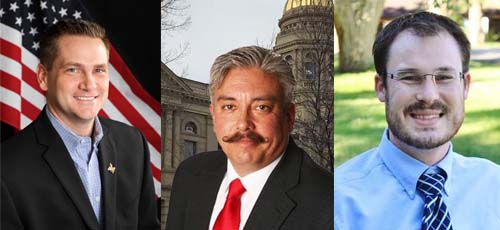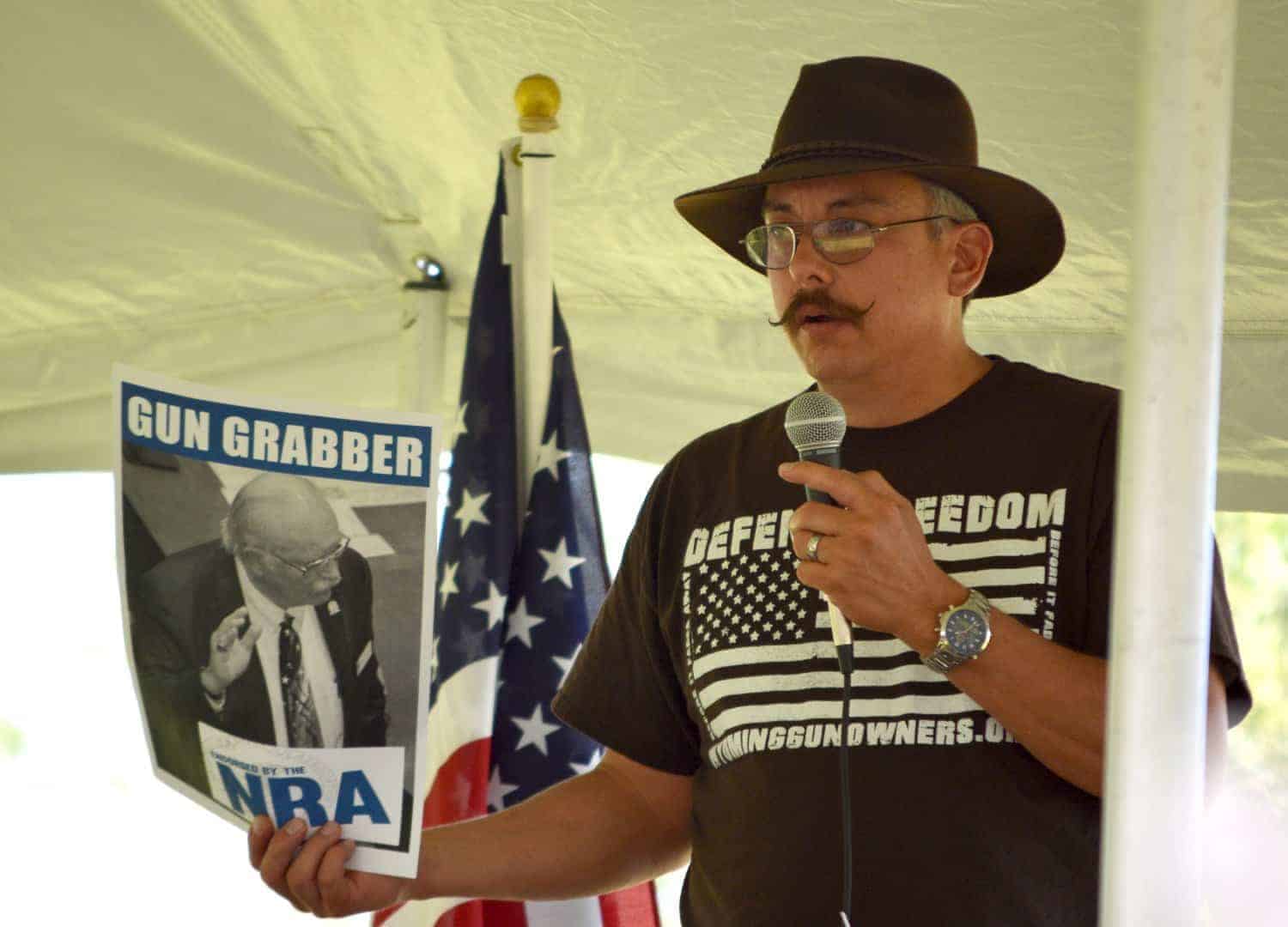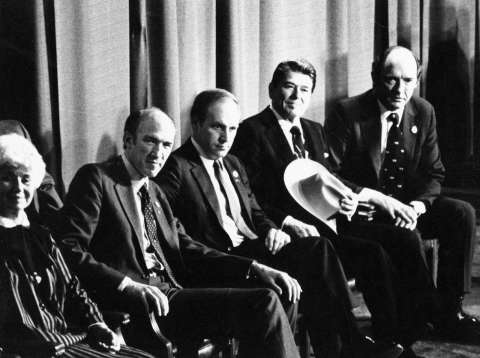Senate Judiciary Committee green-lights gun bills for debate on the floor
The Wyoming Senate hasn’t passed a gun-related bill in the past five years—with no shortage of opportunities. This has provided a sense of optimism for people who oppose two bills currently under consideration that would allow concealed guns on college campuses and in government meetings.
But House Bills 136 and 137 have already passed the House, and the Senate Judiciary Committee on Wednesday voted 4 – 1 to send them to the full Senate for debate. There’s still no assurance they’ll pass into law, but that five-year streak just might end.
Rep. Bo Biteman (R-Sheridan) told the committee he sponsored the bills because he’s “returning rights that shouldn’t have been taken in the first place.” He said Utah established concealed carry on campus about 15 years ago.
“There was no bloodshed,” he told the committee. “It didn’t turn into the Old West. They’re not promoting violence—you won’t even know guns are there.”
Biteman described college campuses as “soft targets” because people can’t defend themselves. “We all know it—gun-free zones don’t work,” he declared.
People who oppose the campus carry bill often argue that the University of Wyoming and the state’s community colleges should have local control over whether guns are allowed on their campuses.
Sen. Anthony Bouchard (R-Cheyenne), who will carry both bills in the Senate, said he understands local control “but local control shouldn’t be there over a right.” He told the Judiciary panel near the beginning of the meeting that members would hear the same arguments opponents always bring up. “We all heard that the sky was going to fall when constitutional carry went into effect. I don’t think there’s going to be a problem here.”
Rep. Scott Clem (R-Gillette), a co-sponsor of both bills, said, “If you’re responsible, we want you to be armed.” When a mass shooter is faced with the possibility he may be answered by someone returning fire, Clem said, “A madman will often back down.”
Students, safety, and suicide
Carolyn Pepper, a UW psychology professor, said young students at the university are of the age “where we see the onset of serious mental illness, particularly depression.” She noted 63 percent of people in Wyoming who commit suicide use firearms.
“This is not an accident—people who commit suicide choose the means that’s most available to them and they feel most comfortable with,” Pepper said. “When I travel around the state, people say [potential suicide victims] will find something else to kill themselves with. This is simply not true. We know from studies all over the world that when you take away the primary means, people don’t have a fall back. … If we can keep guns away from campuses, I think we will reduce the suicide risk in a vulnerable population.”
Noting that the majority of people who testified against HBs 136 and 137 were from the University of Wyoming, Michelle Sabrosky, membership coordinator of Wyoming Gun Owners, said, “Maybe we should look at why kids at the University of Wyoming campus are so sad that they want to end their lives, instead of trying to disarm them.”
Wyoming as a whole ranks consistently among the states with the highest suicide rates in the nation. Sabrosky did not address the “sadness” of Wyomingites in general.
She did add that she has a daughter who attends Casper College who is too young to carry a gun, but her classmates can’t protect her because the campus is gun-free. “We have girls that are victimized on college campuses in this country and in this state every day,” she said. “We cannot disarm these girls and tell them they cannot protect themselves. It’s absolutely absurd.”
Chris Ryan, director of developmental affairs for the Associated Students of UW, said he is a concealed carry permit holder but he’s against allowing guns on campus. He said a preschool and Lab School on campus would both be in danger of losing federal funds if the bill passes. Both ASUW and the Faculty Senate passed resolutions against HB-136.
“We have students who have paid tuition, fees and taxes who will lose not only educational resources but potentially their entire degree program if HB-136 passes unamended,” Ryan said. “Carrying guns on campus endangers facilities and university programs. Not because concealed carry [permit] holders are dangerous, but because of the unregulated nature of concealed carry.”
New contours to the gun-rights landscape
It’s difficult to believe that only two years ago, in 2015, the campaign to end gun-free zones in Wyoming suffered its most bitter defeat to date. After the House’s usual overwhelming vote of approval to allow guns at all public schools—including elementary schools—a Senate committee substituted its own bill for the gun lobby’s plan. There were so many objectionable provisions in the new bill that even the most ardent gun advocates urged its defeat, which came in short order.
Bouchard, then director of the Wyoming Gun Owners, was so incensed at the switcheroo he took to his organization’s Facebook page to accuse three “sneaky Republicans” on the Senate Education Committee of stomping on the rules to promote their anti-gun agenda.
Several things have changed since 2015:
One: An unpopular provision to allow concealed carry permit holders to legally bring guns into public schools was stripped from the bills, which now focus on university and community college campuses and, in HB-137, state and local government meetings.
Two: Anthony Bouchard is no longer director of Wyoming Gun Owners, an organization so pro-gun that it believes the NRA isn’t committed enough to the cause. He’s now Sen. Bouchard, working within the system. He won a three-way GOP primary in Cheyenne by five votes last November.
Three: There’s a new sheriff running the Senate. Sen. Eli Bebout (R-Riverton) has taken over as president from Sen. Phil Nicholas (R-Laramie), who used to bury pro-gun bills in committees that wouldn’t even hold hearings on them.
Bebout is solidly pro-gun. He won the NRA’s endorsement in his failed 2002 gubernatorial bid. He voted to approve constitutional carry in 2011 and sponsored a bill in 2010 that passed, granting concealed carry permits from other states legal reciprocity in Wyoming.
Chris Boswell, vice president of governmental and community affairs at UW, said he wasn’t surprised to see the Judiciary Committee approve both bills. “I think there was a real desire by the committee to have this make it to the floor,” he said. “In the past the strategy has been to either significantly impact the bill in committee, or just not have it come out of committee.
“That wasn’t realistic this time,” he said. “There’s a recognition that there’s a desire from legislative leadership to debate it on the floor of the Senate. So it will happen.”
How much pressure will Bebout be able to exert on his fellow senators to pass the bill, if that’s his choice? We should find out next week. If the bill goes through the Senate without any amendments, like it did in the House, there won’t even be a need for a conference committee to work out differences—it would go straight to Gov. Matt Mead’s desk.







Comments are closed.